Chinese town on North Korean border faces bleak business prospects
With a special neighbor, Chinese town on NK border faces bleak business prospects
Dandong New City, a district of Dandong which was built from scratch to be a China-North Korean trade hub, now stands mostly empty. Many cooperation projects in the area have stalled due to North Korea's political instability. Meanwhile, Dandong's traders are worried that the latest UN sanctions on North Korea will further squeeze their businesses, at a time of general economic difficulty.
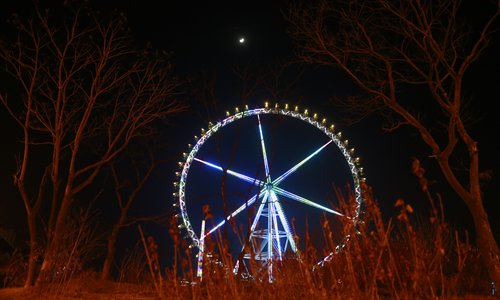
An empty ferry wheel is illuminated at night in Dandong New City. Photo: Li Hao/GT
From a distance, Dandong New City, a district in Dandong, Northeast China's Liaoning Province, looks like a sparkling example of China's urbanization.
Dozens of modern skyscrapers form an impressive skyline on the Yalu River, which demarcates the China-North Korea border. The city also boasts a massive government building, a large commercial complex and a riverside park with a ferry wheel.
But there is one thing that the district is short of: people. During the day, few cars travel on the 10-lane, 70 meter-wide main road; not a single store is open on its commercial pedestrian street, and the ferry wheel never moves. When night falls, the emptiness of Dandong New City is eerie as neon lights illuminate the hollow skyscrapers.
The story of Dandong New City is more than just a story of a city's failed attempt at rapid urbanization. The past and present of the district is probably the best symbol for how the China-North Korea relationship has changed over the past decade.
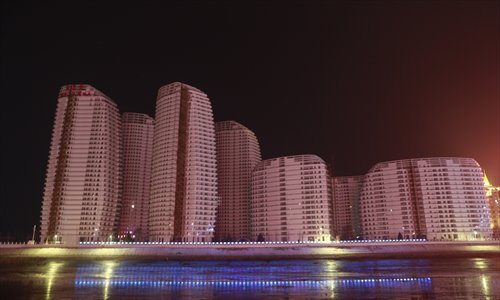
Empty apartment buildings on Moon Island in Dandong New City. Photo: Li Hao/GT
Remnants of a city's dreams
When the district was built from expanses of farmland seven years ago, it was meant to be a hub for bilateral trade.
At the southern end of the district, the two countries planned a modern, cable-stayed New Yalu River Bridge linking Dandong New City with Sinuiju, a North Korean city that was once a special administrative region that the neighboring nation used to experiment with a market economy.
The district is also adjacent to Hwanggumpyong Island to its southwest, a China-North Korea "special economic zone" whose launching ceremony was attended by top officials such as Chen Deming, then China's Minister of Commerce, and the late Jang Sung-taek, an uncle of North Korean leader Kim Jong-un who was once seen as the second most powerful figure in the country. He has since been purged, and North Korean state media reported his execution in December 2013.
From 2009 to 2012, Dandong's local media hyped the district's promising future as a "once-in-a-century opportunity," and for a while, Chinese investors and traders flocked to Dandong New City, hoping to tap into the massive potential of Sinuiju - hoping that if it opened up it might replicate the success of Shenzhen, which was turned into a metropolis and an economic hub through economic liberalization in the 1980s.
But all that is distant memory today. Seen from the Chinese border, the Hwanggumpyong special economic zone is now covered with weeds and sand. The 2.2 billion yuan ($338 million), 3-kilometer New Yalu River Bridge, although finished, stretches across the river and touches farmland in Sinuiju, as North Korea hasn't built roads on their side to link up with the bridge.
"After Jang Sung-taek was purged by North Korea in December 2013, most of these projects were delayed indefinitely - there hasn't been an official cancellation, but no progress has been made in the past three years," Lü Chao, director of the North and South Korea Research Center at the Liaoning Academy of Social Sciences, told the Global Times.
"Many investors in Dandong New City have hence pulled out, seeing that the cooperation with North Korea didn't work out," he said.
The Administration Committee of Dandong New City refused an interview request by the Global Times.
"We're not able to talk right now, considering the tense political situation and the sensitive geographical location of the New City," a spokeswoman at the committee told the Global Times.
In Wujin Town, a commercial area in Dandong New City, more than two thirds of shops are either closed or have moved out. "This place is hopeless," Xiu Tiandi (not his real name), a 27-year-old Dandong entrepreneur who runs a wallpaper shop there, told the Global Times.
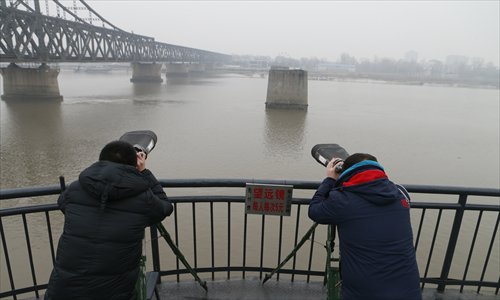
Tourists to Dandong try to sneak a peek of the North Korean side across the Yalu River. Photo: Li Hao/GT
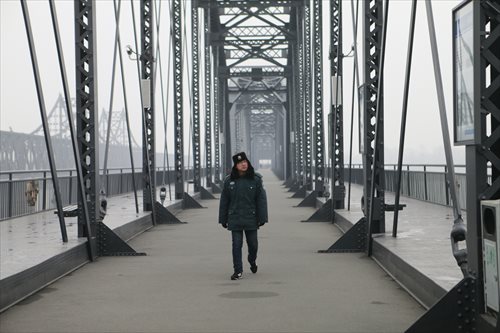
Photo: Li Hao/GT
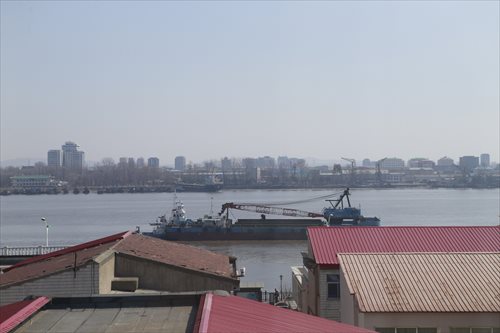
Photo: Li Hao/GT
Deserted new town
The Dandong government has done what it can to boost the area - it moved some of its government buildings here, and has been building schools and hospitals in the area to make it more livable. But the efforts haven't paid off so far. Official data shows that by the end of 2014, the city, which was designed to be home to at least 400,000 people and is about the size of San Francisco, only had around 60,000 residents.
The local government has tried to attract retailers, waiving rents for small businesses and offering subsidies. Xiu, for example, said he had rented his 100-square meter, two-storey shop for virtually nothing for three years.
That didn't work well either. Businesses keep moving out due to a lack of customers. A local resident said she needs to walk half an hour to get to her nearest grocery store.
Xiu said his shop barely breaks even. He now drives a taxi in his spare time to support his shop and staff. "I used to live on the second floor of my shop, but I was so scared at night that I moved out, only coming back during the day," he told the Global Times.
Despite the setbacks, local officials still seem to harbor hopes for the New City. Last October, a billion-yuan China-North Korea Border Trade Area was established in the New City. In the launching ceremony, Dandong mayor Shi Jian said he hoped the city would become "a bright pearl on the maritime Silk Road."
The area, set to open officially this April, allows border residents to purchase or barter with North Korean traders directly, and purchases of items under 8,000 yuan will be duty-free, the Xinhua News Agency reported. But when the Global Times visited in March, the zone looked completely deserted, with no sign of any businesses inside.
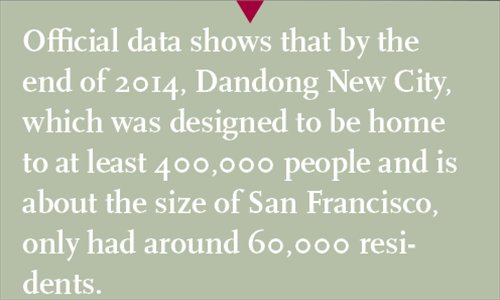
Sanctions suffocate
Local officials' aspirations for Dandong are not totally unfounded. Over 70 percent of China-North Korean trade goes through Dandong via over 500 trading companies based in the city. The city's tourism industry is also based on its proximity to North Korea, attracting visitors who are curious about the mysterious country, which reminds many of China in the 1970s. In Dandong's restaurants, middle-aged North Korean businessmen wearing Kim Il-sung and Kim Jong-il badges are not an uncommon sight.
"Dandong is like a barometer for China-North Korea trade," Jin Qiangyi, director of the Asia Research Center, China's Yanbian University, told the Global Times.
But China-North Korea trade volume is still meager, equal to around 2 percent of China's trade with South Korea. And as the latest UN sanctions on North Korea approved earlier this month come into force, Dandong's traders are worried about the city's economic future.
The United Nations Security Council unanimously agreed on March 2 to impose greater sanctions on North Korea in response to the country's repeated nuclear and missile tests. The sanctions order all North Korean imports and exports to go through thorough inspections and bans countries from buying a list of commodities from North Korea including coal, iron ore, gold and titanium ore. It also bans nations from supplying aviation fuel to the country that could be used for further tests.
On China's side of the Yalu River Railway Bridge, an iron truss bridge built by the Japanese in the late 1930s in Dandong's old city, empty trucks that have just returned from North Korea pass through the customs checkpoint one after another. In 10 minutes, seven trucks passed through the checkpoint. Truck drivers say how much they are bringing across the border seems to have slightly dipped in the past two weeks.
"It takes longer to pass the checkpoints, and inspections seem to be stricter," a truck driver said.
Since the new bridge isn't open, the relic over the river is the only way Chinese trucks can enter North Korea, but Lü Chao said it is too old to cope with the large volumes of traffic that drive over it every day, and last year the local government had to close the bridge for a few days to strengthen it with steel plates.
In the Jiadi Center, two buildings in Dandong's old town which are occupied by hundreds of trading companies, sanction are putting pressure on business. "This year's sanctions seem to be the toughest in years, and everyone's worried," said a staff member surnamed Yang, who works in a trading company.
A manager at Dandong Xinlian Trade Company, which trades clothing with North Korea, said businesses have been generally struggling in the past months due to rocky economy, and the latest sanctions can only further worsen it.
Traders also complained about a lack of clarity in what goods they can trade, and what they cannot.
Professor Jin said it's yet too early to see the effects of the sanctions, and the Chinese government has yet to roll out a detailed categorization on what goods are civil - meaning trading is allowed - and what count as military and are therefore banned. "Currently, the line is still blurred," he said.
Traders and businessmen in Dandong have strong hopes that one day, their counterparts across the Yalu River would open up. "Of course we hope North Korea would [open up]. If it does, Dandong would become much better off," a manager at Dandong Xinlian Trade Company told the Global Times.
"I used to have a secret aspiration that if it opens up, I would open a shop in North Korea, and maybe I can earn a fortune out of it," Xiu, the shop owner, echoed.
But so far, that dream is far from becoming a reality.
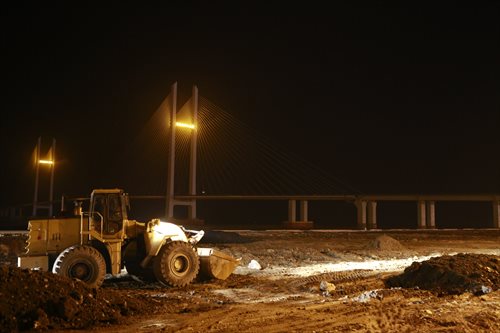
Trucks on the uncompleted roads in Dandong New District.Photo: Li Hao/GT
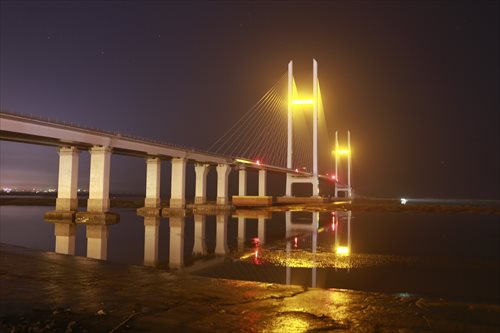
The New Yalu Bridge in the New District, which connects Dandong with Sinuiju, North Korea, was planned to open in October 2014, but was delayed indefinitely. Photo: Li Hao/GT
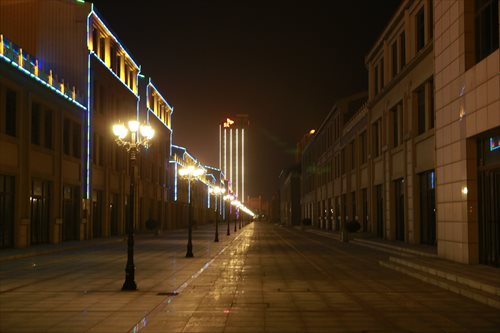
The largely empty streets in Dandong New District at night. Photo: Li Hao/GT
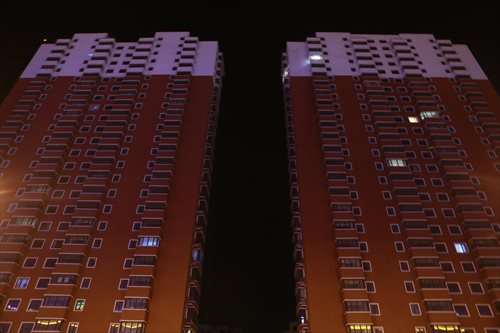
The largely empty apartment buildings in Dandong New District at night. Photo: Li Hao/GT
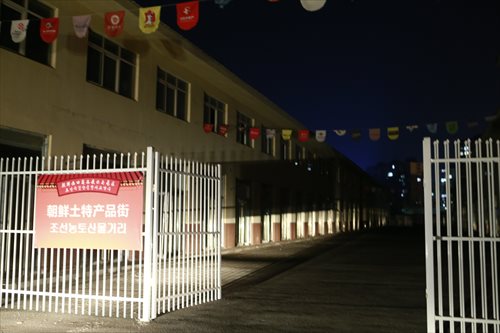
A street designed to sell North Korean food remains empty, with no shops open. Photo: Li Hao/GT
Newspaper headline: Frozen frontier